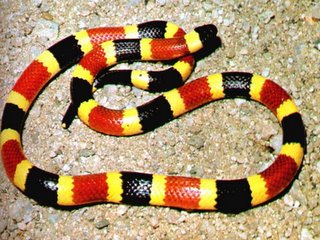 As a jogger was passing by our house on Saturday morning, he warned Kelly that a snake was heading toward our garage. Kelly spotted the slimy, speedy Texas native, and quickly tried to recall the rhyme, "Red on black, friend to Jack, red on yellow, kill a fellow."
As a jogger was passing by our house on Saturday morning, he warned Kelly that a snake was heading toward our garage. Kelly spotted the slimy, speedy Texas native, and quickly tried to recall the rhyme, "Red on black, friend to Jack, red on yellow, kill a fellow." Oh no! It's a kill a fellow! He suddenly grabbed the nearest lawn tool, a garden hoe, and called me out to the garage to keep an eye on our visitor. Then he started whacking the concrete driveway, and the snake started hissing at him. He missed it a few times, knocking a chunk out of the cement, then chopped it in half and both sides were still wiggling all over the place.
We left it, hoping something would claim it for lunch, and several hours later when we returned home, noticed there were no takers.
Here's what I found out about coral snakes: "The coral snakes are relatively small snakes that spend most of their time underground. Their primary food is other snakes. Despite their small size and small fangs, their venom is extremely toxic.
"Recently deceased snakes can still have a bite reflex. Additionally, the poisons from these animals can still affect you long after they've been dead should you snag your skin on a fang for example."
For the record, and to avoid being like the Middle Eastern journalists who have been charged with distorting images of the bombing in Israel and Lebanon, this is NOT the actual snake that crossed our path. The one we encountered was more like a baby snake, approximately twelve to fifteen inches long and about as wide as a Magic Marker.
Comments